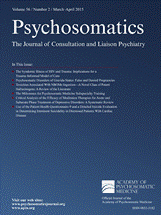 | |
| Discipline | Psychosomatic medicine |
|---|---|
| Language | English |
| Edited by | T.A. Stern |
| Publication details | |
| History | 1960-present |
| Publisher | Elsevier on behalf of the Academy of Psychosomatic Medicine |
| Frequency | Bimonthly |
| 1.660 (2010) | |
| Standard abbreviations | |
| ISO 4 | Psychosomatics |
| Indexing | |
| CODEN | PSYCBC |
| ISSN | 0033-3182 (print) 1545-7206 (web) |
| LCCN | 65029473 |
| OCLC no. | 01763070 |
| Links | |
Psychosomatics is a peer-reviewed medical journal that focuses on psychosomatic medicine. It was established in 1960, during William S. Kroger's tenure as head of the Academy of Psychosomatic Medicine. [1] It is published by Elsevier on behalf of the Academy of Psychosomatic Medicine.